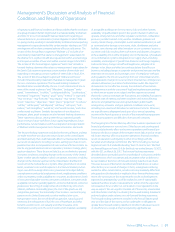Walmart 2013 Annual Report Download - page 30
Download and view the complete annual report
Please find page 30 of the 2013 Walmart annual report below. You can navigate through the pages in the report by either clicking on the pages listed below, or by using the keyword search tool below to find specific information within the annual report.
Management’s Discussion and Analysis of Financial
Condition and Results of Operations
28 || Walmart 2013 Annual Report
Interest Rate Risk
We are exposed to changes in interest rates as a result of our short-term borrowings and long-term debt issuances. We hedge a portion of our interest
rate risk by managing the mix of xed and variable rate debt and entering into interest rate swaps.
The table below provides information about our nancial instruments that are sensitive to changes in interest rates. For debt obligations, the table
represents the principal cash ows and related weighted-average interest rates by expected maturity dates. For interest rate swaps, including forward
starting interest rate swaps, the table represents the contractual cash ows and weighted-average interest rates by the contractual maturity date,
unless otherwise noted. The notional amounts are used to calculate contractual cash ows to be exchanged under the contracts. The weighted-
average variable rates are based upon prevailing market rates at January 31, 2013.
Expected Maturity Date
(Amounts in millions) Fiscal 2014 Fiscal 2015 Fiscal 2016 Fiscal 2017 Fiscal 2018 Thereafter Total
Liabilities
Short-term borrowings:
Variable rate $6,805 — — — — — $ 6,805
Weighted-average interest rate 0.1% — — — — — 0.1%
Long-term debt:
Fixed rate $4,542 $3,569 $4,235 $1,127 $1,128 $27,824 $42,425
Weighted-average interest rate 3.9% 2.3% 2.3% 2.8% 5.4% 5.3% 4.6%
Variable rate $1,045 $ 184 $ 327 — — — $ 1,556
Weighted-average interest rate 3.0% 0.9% 0.6% — — — 2.3%
Interest rate derivatives
Interest rate swaps:
Variable to xed
(1)
$3,045 $2,684 $ 327 — — — $ 6,056
Weighted-average pay rate 2.5% 2.7% 0.9% — — — 2.5%
Weighted-average receive rate 0.4% 0.3% 0.6% — — — 0.4%
Fixed to variable $2,445 $1,000 — — — — $ 3,445
Weighted-average pay rate 0.7% 0.3% — — — — 0.6%
Weighted-average receive rate 5.0% 3.1% — — — — 4.4%
(1) Forward starting interest rate swaps have been included in the fi scal 2014 and 2015 maturity categories based on when the related hedged forecasted debt issuances,
and corresponding swap terminations, are expected to occur.
Purchase obligations include legally binding contracts such as rm
commitments for inventory and utility purchases, as well as commitments
to make capital expenditures, software acquisition and license com-
mitments and legally binding service contracts. Purchase orders for the
purchase of inventory and other services are not included in the table
above. Purchase orders represent authorizations to purchase rather than
binding agreements. For the purposes of this table, contractual obligations
for purchase of goods or services are de ned as agreements that are
enforceable and legally binding and that specify all signi cant terms,
including: xed or minimum quantities to be purchased; xed, minimum
or variable price provisions; and the approximate timing of the transaction.
Our purchase orders are based on our current inventory needs and are
ful lled by our suppliers within short time periods. We also enter into
contracts for outsourced services; however, the obligations under these
contracts are not signi cant and the contracts generally contain clauses
allowing for cancellation without signi cant penalty.
The expected timing for payment of the obligations discussed above is
estimated based on current information. Timing of payments and actual
amounts paid with respect to some unrecorded contractual commitments
may be di erent depending on the timing of receipt of goods or services
or changes to agreed-upon amounts for some obligations.
In addition to the amounts shown in the table above, $818 million of
unrecognized tax bene ts are considered uncertain tax positions and
have been recorded as liabilities. The timing of the payment, if any,
associated with these liabilities is uncertain. Refer to Note 9 in the
“Notes to Consolidated Financial Statements” for additional discussion
of unrecognized tax bene ts.
O Balance Sheet Arrangements
In addition to the unrecorded contractual obligations presented above,
we have entered into certain arrangements, as discussed below, for
which the timing of payment, if any, is unknown.
In connection with certain debt nancing, we could be liable for
early termination payments if certain unlikely events were to occur.
At January 31, 2013, the aggregate termination payment would have
been $104 million. The arrangement pursuant to which this payment
could be made will expire in scal 2019.
The Company has future lease commitments for land and buildings
for approximately 366 future locations. These lease commitments have
lease terms ranging from 4 to 50 years and provide for certain minimum
rentals. If executed, payments under operating leases would increase by
$82 million for scal 2014, based on current cost estimates.
Market Risk
In addition to the risks inherent in our operations, we are exposed to
certain market risks, including changes in interest rates and uctuations
in currency exchange rates.
The analysis presented below for each of our market risk sensitive
instruments is based on a hypothetical scenario used to calibrate
potential risk and does not represent our view of future market changes.
The e ect of a change in a particular assumption is calculated without
adjusting any other assumption. In reality, however, a change in one
factor could cause a change in another, which may magnify or negate
other sensitivities.
























